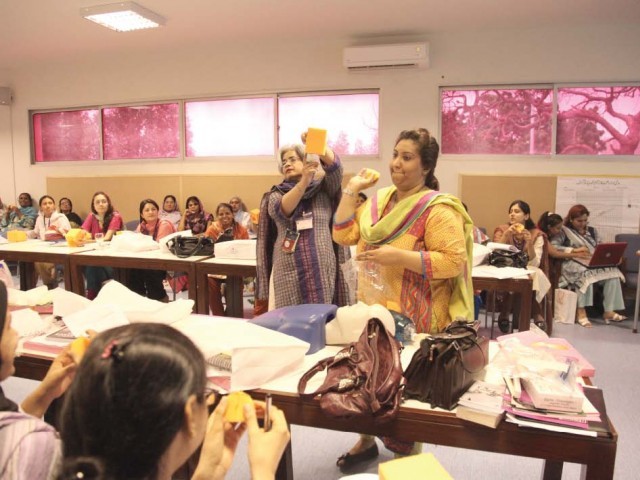Birth control: After 20 years of doing it wrong, policymakers need to change approach to family planning
Published: July 2, 2011

Dr Sadiah Pal holds up a dummy for a womans anatomical features with an assistant while training doctors and midwives at the intensive course in emergency obstetrics and neonatal care at Jinnah hospital on Friday. PHOTO: EXPRESS
KARACHI: Telling couples that they need to limit the number of children they have doesnt go down well in Pakistan, as the failure of family planning programmes testifies. What policymakers should have done instead, to achieve the same results, was to educate couples on the risks to the health of the mother and baby if wise decisions are not made.
Thus, a good 20 years have been wasted presenting family planning initiatives to people in the wrong light, argues Dr Nasser Mohiuddin, who runs the National Trust for Population Affairs planning and development department.
Speaking to The Express Tribune on the sidelines of the inaugural session of a three-day seminar on Emergency Obstetrics and Neonatal care at Jinnah hospital, he explained why there has been mass rejection of family planning in the country.
Today 3.9 is the births per woman for Pakistan, down from 6.1 ten years ago and just one-third of women use contraception. Nearly 1 out of 93 women face the risk of dying while in the labour room, according to World Development Indicators for 2011 released by the World Bank.
The good news is that the mistake has been realised and the agenda has been realigned, he said. But it will take some time to undo the damage done, he explained.
Take the examples of Iran and Indonesia that are Muslim countries which have successfully managed to educate their populations. In Iran, a fatwa was passed by a religious leader that family planning was not anti-Islam and this went a long way in getting people to accept it. In Pakistan, however, when the work started, religious leaders were not taken on board to promote acceptance over the use of family planning. This mistake is being corrected in many areas across the country today. Still, a measure of the acceptance is that 60%of babies are still being delivered at home without any skilled help in Pakistan. According to Mohiuddin, many families would completely avoid polio vaccine drops for their children or iodised salt for themselves as they believe they were secret state measures for family planning.
EmONC seminar
The experts discussed a number of emergencies which arise during pregnancy and child birth. Tips, techniques and training were shared and demonstrated in the day-long session which involved role-play at the end of each topic to reinforce the teachings.
While the participants were mainly doctors, nurses, midwives, several questions seemed to demonstrate that they did not have a basic understanding of how to deal with labour complications. This gap in reliable information and a lack of proper training for medical staff is one of the major reasons behind many avoidable maternal deaths.
One of the facilitators, Dr Sadiah Ahsan-Pal, highlighted the importance of counselling the mother in labour and keeping family members aware of the procedure. This helps the doctor gain their trust, allows the mother and the family to relax and avoid any unnecessary delays or complications. The importance of antenatal and post-natal care was emphasised along with addressing and planning for the economic and social aspects accompanying child birth at healthcare facilities.
Emergency situations
More than half of maternal deaths occur within 24 hours of child birth, mostly due to severe bleeding. Presentations were made on emergency preparedness, active management of the third stage of labour, post partum haemorrhage (PPH), the use of misoprosotol and eclampsia and pre-eclampsia or hypertension during the pregnancy.
A detailed discussion and role playing was conducted on bleeding, which accounts for about 25% of maternal deaths and eclampsia which is also one of the leading causes for high maternal mortality.
Published in The Express Tribune, July 2nd, 2011.
Published: July 2, 2011

Dr Sadiah Pal holds up a dummy for a womans anatomical features with an assistant while training doctors and midwives at the intensive course in emergency obstetrics and neonatal care at Jinnah hospital on Friday. PHOTO: EXPRESS
KARACHI: Telling couples that they need to limit the number of children they have doesnt go down well in Pakistan, as the failure of family planning programmes testifies. What policymakers should have done instead, to achieve the same results, was to educate couples on the risks to the health of the mother and baby if wise decisions are not made.
Thus, a good 20 years have been wasted presenting family planning initiatives to people in the wrong light, argues Dr Nasser Mohiuddin, who runs the National Trust for Population Affairs planning and development department.
Speaking to The Express Tribune on the sidelines of the inaugural session of a three-day seminar on Emergency Obstetrics and Neonatal care at Jinnah hospital, he explained why there has been mass rejection of family planning in the country.
Today 3.9 is the births per woman for Pakistan, down from 6.1 ten years ago and just one-third of women use contraception. Nearly 1 out of 93 women face the risk of dying while in the labour room, according to World Development Indicators for 2011 released by the World Bank.
The good news is that the mistake has been realised and the agenda has been realigned, he said. But it will take some time to undo the damage done, he explained.
Take the examples of Iran and Indonesia that are Muslim countries which have successfully managed to educate their populations. In Iran, a fatwa was passed by a religious leader that family planning was not anti-Islam and this went a long way in getting people to accept it. In Pakistan, however, when the work started, religious leaders were not taken on board to promote acceptance over the use of family planning. This mistake is being corrected in many areas across the country today. Still, a measure of the acceptance is that 60%of babies are still being delivered at home without any skilled help in Pakistan. According to Mohiuddin, many families would completely avoid polio vaccine drops for their children or iodised salt for themselves as they believe they were secret state measures for family planning.
EmONC seminar
The experts discussed a number of emergencies which arise during pregnancy and child birth. Tips, techniques and training were shared and demonstrated in the day-long session which involved role-play at the end of each topic to reinforce the teachings.
While the participants were mainly doctors, nurses, midwives, several questions seemed to demonstrate that they did not have a basic understanding of how to deal with labour complications. This gap in reliable information and a lack of proper training for medical staff is one of the major reasons behind many avoidable maternal deaths.
One of the facilitators, Dr Sadiah Ahsan-Pal, highlighted the importance of counselling the mother in labour and keeping family members aware of the procedure. This helps the doctor gain their trust, allows the mother and the family to relax and avoid any unnecessary delays or complications. The importance of antenatal and post-natal care was emphasised along with addressing and planning for the economic and social aspects accompanying child birth at healthcare facilities.
Emergency situations
More than half of maternal deaths occur within 24 hours of child birth, mostly due to severe bleeding. Presentations were made on emergency preparedness, active management of the third stage of labour, post partum haemorrhage (PPH), the use of misoprosotol and eclampsia and pre-eclampsia or hypertension during the pregnancy.
A detailed discussion and role playing was conducted on bleeding, which accounts for about 25% of maternal deaths and eclampsia which is also one of the leading causes for high maternal mortality.
Published in The Express Tribune, July 2nd, 2011.






































